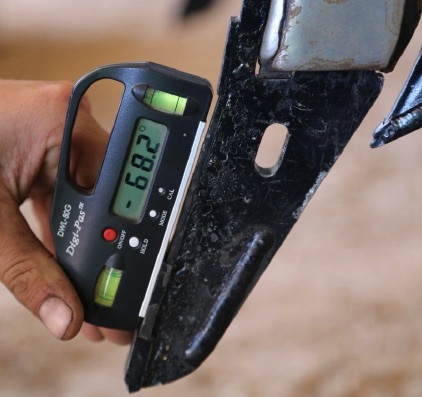Ag Tech Sunday - Closing the loop: Connecting Ag Tech and Agribusiness
- By: "Farm Tender" News
- Ag Company News
- Nov 30, 2019
- 1058 views
- Share

This article is bought to you by Warrick Hay & Grain and Air Seeder Consulting Services.
By Michael Macolino - Senior Manager - Technology Advisory at BDO | Digitizing Agribusiness
Australia’s AgTech ecosystem has evolved rapidly in the past two years. Funding from government, industry and institutional investors has increased. Meanwhile, farmers are showing heightened interest in agricultural technologies to optimise input efficiency and maximise yields.
There is no doubt that these technologies will play a key role in getting Australia’s agribusiness industry to its $100 billion target. But we aren’t there yet. AgTech still faces some significant challenges - the recent Australian British Chamber of Commerce (ABCC) Agribusiness – Australia’s Powerhouse event in Perth discussed how to overcome these issues and get agribusinesses engaging in technology on a wider scale.
NURTURING OUR AG-TECH LANDSCAPE
Australia’s Ag-Tech industry is in its early stages, but has developed significantly driven by new sources of capital, co-ordination from Rural Research and Development Corporation’s (RDC’s) and interest from corporate Agribusiness.
We have also seen the establishment of AgTech focused incubators and accelerators such as SproutX, ThincLab, Farmers 2 Founders and Agri Start. These programs and facilities are quickly becoming the foundational infrastructure to support commercialisation of a broad range of technologies and business models.
Universities are working closely with industry to find new ways of commercialising emerging technologies, while providing students with opportunities to pursue entrepreneurship as a viable mechanism for applying their research to real world problems in Agriculture.
CLOSING THE AG-TECH LOOP
Despite growth in the AgTech sector, there are still some significant challenges to overcome before it can make a meaningful impact on Agricultural productivity.
Most AgTech is based on a core set of emerging technologies, which are often referred to as ‘Industry 4.0 Technologies’. These include Internet of Things (IOT), Robotics, Artificial Intelligence and the data driven software connecting our world.
When correctly leveraged and integrated, these technologies create a unified system of sensing, analysis and action. The promise of AgTech is realising a closed loop system of information, constantly monitoring production and optimising the application of inputs based on analysis against a range of scenarios.
The challenge for Ag-Tech is building this closed loop system.
AgTech is mostly being deployed in isolation without a strategic approach, either on farm or into the broader Agricultural supply chain. Huge amounts of data are captured and processed, but the insights often end up in spreadsheets or isolated in systems which aren’t designed to draw value from this information.
Ad- Warrick Hay & Grain - Professional Grain and Hay Storage - Ad
Ad - Get your Seeder set up the right way. Contact Air Seeder Consulting Services and have your Seeder running right before you start - Ad
The success of AgTech depends on closing these loops, requiring co-ordination throughout the Agricultural value chain. By achieving this, many Agricultural challenges will be solved, such as minimising resource use, maximising yields and providing transparency to consumers.
FUNDING AG-TECH INNOVATION
Agriculture has been a driver of innovation for centuries, previously leveraging emerging technologies like steam power and electricity to achieve step changes in productivity.
Farmers are renowned for their creative problem-solving abilities, influenced by remoteness and scarcity of resources. This thirst for innovation should be
a perfect match for the adoption of AgTech, and in many cases it has been, but there is emerging scepticism within Agribusiness that presents a risk to the burgeoning AgTech industry.
The disconnect lies in the way Farmers adopt technology and the way that Venture Capital backed start-ups are forced to sell technology and scale their companies.
When a start-up raises Venture Capital the clock starts ticking. They have 7 – 10 years to multiply that capital by 10 and secure a profitable exit. Start-ups will often focus on growth over profitability, with market penetration being the measure of success. Applying this fast pace of innovation to Agriculture is important to bridging that disconnect.
Some AgTech, such as Farm Management software, will still follow the predicable development and adoption cycles we see in other industries. More revolutionary technologies such as Robotics, Block Chain and Artificial Intelligence, will take much longer to be adopted and reach scale within Agriculture.
Feedback from our Agribusiness clients at BDO indicates that AgTech companies are failing to provide the robust solutions or the level of value required to justify investment in the technology. We have also seen instances where the technology solution is proven, but the company lacks the resources required to scale to the level required by the farmers operation.
At the ABCC event, we discussed how the Agricultural Industry could provide the longer-term investment required for these deep technologies to develop and scale. A long-term industry backed funding model will heavily influence the business models of AgTech start-ups, enabling a focus on profitability, technology and adoption.
Ad- Warrick Hay & Grain - Professional Grain and Hay Storage - Ad
Ad - Get your Seeder set up the right way. Contact Air Seeder Consulting Services and have your Seeder running right before you start - Ad 










Share Ag News Via